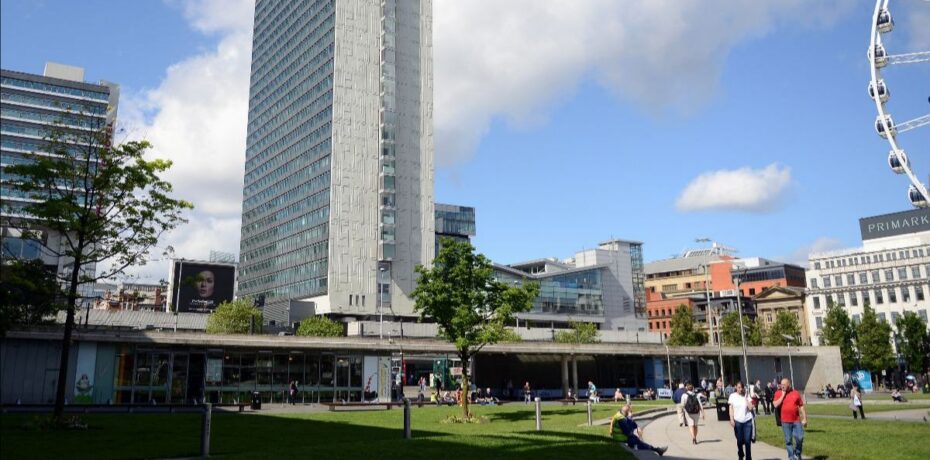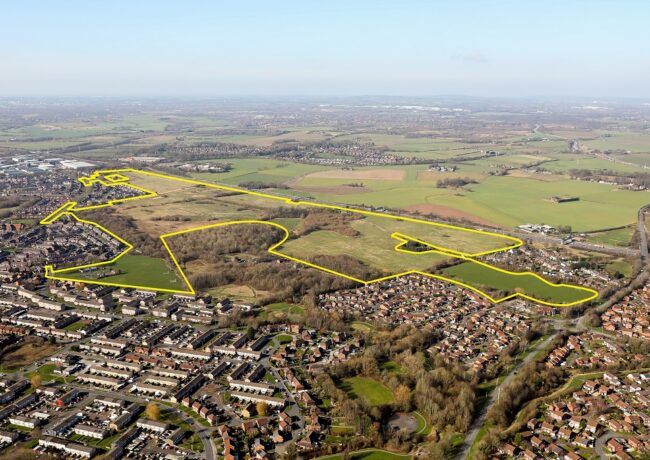The Subplot
The Subplot | Money talks, digital deals, Liverpool resi
Welcome to The Subplot, your regular slice of commentary on the North West business and property market from Place North West.
This week: there is the scent in the air of a big Manchester tech relocation deal, Subplot attempts to sniff it out. Schroders, one of Greater Manchester’s most enthusiastic investors, explains how it sees the post-pandemic future. Meanwhile, we uncover the latest problems facing the 143,000 sq ft Factory arts venue and check on Liverpool’s hectic city centre residential market.

MONEY TALKS
Ultimately capital markets will decide the future of Greater Manchester’s post-pandemic property business. So, who better to ask than the man who runs an £8bn UK property portfolio? Subplot spoke exclusively to Nick Montgomery, Schroders’ head of UK real estate investment, about sheds, flexible workspace and hotelification.
Schroders’ real estate business has a huge stake in Greater Manchester’s future. The £200m purchase of 260,000 sq ft No 1 Spinningfields in 2017 came three years after the £132m purchase of the 615,000 sq ft City Tower (pictured above). Schroders hasn’t stopped buying: last month it acquired the 150,000 sq ft Stanley Green Trading Estate at Cheadle for £17.25m, a blended net initial yield of 5.2%. Manchester is one of the handful of “winning cities” identified for investment in Schroders’ strategy. This is a source of pride to Montgomery, a veteran of the Chesterton office at Deansgate from 1997-99 and someone who knows the city well. A big financial services signing (announcement awaited) has created an upbeat mood. It follows the December 2020 letting of 11,300 sq ft to law firm Fieldfisher at No 1 Spinningfields.
The pivot to sheds
Schroders is best known in this region for office investment, but its UK-wide portfolio is not quite so skewed. Montgomery explains: “The weighting is different across the portfolio as a whole, and in the long term I can see us investing more in both sectors in Greater Manchester.” Today, the last-mile urban logistics potential offered by sites like Stanley Green is very appealing. Schroders plans another £7m-£8m investment in the site with the aim of creating a £30m asset. Montgomery says: “We bought this partly with urban logistics in mind. We think we can get another 50,000 sq ft on the site, and we’ve already had a call from someone who’d take a pre-let on all of it because land supply on that side of the A555 is so tight.” If Schroders could create more £30m logistics/trade counter lots in the North West, then it probably would.
Serviced offices
The investment house is already piloting its own serviced office brand, Elevate. Schroders announced a small amount, 2,600 sq ft, of landlord-operated co-working in the podium at City Tower in 2018, long before the pandemic, but recent experience has convinced Montgomery that a flexible workspace offer is essential. The Elevate allocation at City Tower is likely to grow through 15,000 sq ft to 50,000 sq ft, and to do so rapidly. Montgomery says: “It is vital to have a landlord-controlled ability to provide flexible fitted-out floorspace, it is key to a building like City Tower. The first phase fit-out at Elevate City Tower is just finished and it’s working really well. We’ve signed with a financial business to put 50 people in there. If instead we’d just sat back, and left this as refurbished floorspace, we’d be sitting on vacancy.”
Flexible friends
Schroders is deadly serious about its flexible workspace offer. Montgomery explains: “We’re not trying to compete with a full serviced offer, like some brands. But we’re hearing back from occupiers that service levels [in full service brands] are dropping and tenants looking at the 5,000 sq ft-10,000 sq ft suite level want more flexibility, less money up front, and not to have to share a coffee point with another business. So that’s what we are providing. You have to be able to offer this to retain occupiers.”
Lessons from WeWork
Schroders is the landlord at WeWork’s 60,000 sq ft hub at No 1 Spinningfields. The hub survived a review of WeWork’s Manchester outlets carried out last summer. Montgomery admits that the landlord has offered to help. He says: “We’re working with them so that they survive and flourish and get out of this. I don’t know if WeWork will be around later in the 2020s, our view is that whether WeWork is providing flexible space, or we are providing it, this kind of service is complementary to the building.” In a statement to Subplot, WeWork said it was committed to its four Manchester hubs, including No 1 Spinningfields. Whether the same goes for Schroders – with its own flexible brand up its sleeve – feels like another question entirely. Strained relationships over the summer may not have helped.
And hotels too
Montgomery also has plans for The Mercure Hotel end of the City Tower complex. He says: “Looking ahead 10 years, a hotel on that site could be really complementary to what we’re doing. When the hotel market stabilises, post-pandemic, we will invest alongside the operator to improve the offer. It traded well before coronavirus, but we can see some improvements we could make. We could improve density, and there are amazing basements in City Tower that could be connected to the hotel. It already has an amazing conference facility.” Montgomery says this plan is two or three years from action. Schroders is in Manchester for the long term, but as the lockdown ends, and normal life resumes, watch it move more aggressively into both urban logistics and experiments with flexible workspace.
Conclusion: Schroders won’t be the only major-league investor in the city heading down these roads.
DRIVING THE WEEK

LAG Pritchard Architects designed the scheme
SIMMER DOWN
Later today, Liverpool City Council’s planning committee votes on Waterloo Tower’s plans (pictured left) for a 16-storey residential block overlooking the waterfront, next to Stanley Dock. The Voyager scheme has shrunk from an original 40 storeys. What does this tell us about the city’s residential market, or the city’s planners?
Chris Saggers’ development vehicle Waterloo Tower originally considered a 40-storey scheme on the site of the Bacchus Green Taverna near Stanley Dock. It fell to 16 after talks with the council. It would be easy to assume the sudden shrinkage of the 135-apartment scheme shows that Liverpool planners suddenly got punchy. But it’s not the planners that are getting tough – developers themselves are grappling to match land values with overall scheme viability.
Doing the sums
City Residential’s latest quarterly analysis shows 17,000 (non-BTR) residential units in the pipeline. Of these, 3,345 are under construction, most due to deliver this year, with another 800 due in 2022, although City Residential reckons total delivery by 2022 will climb by a further 1,500 units once latecomers are included. The unsurprising truth is that a lot of those consented schemes are more about pushing up land values by piling on extra units, than creating potentially viable developments. Subplot is told Voyager’s shrinkage may have cut the land value (back-of-the-envelope calculation alert) from about £4m to £2m, which is serious money lost. Various agents have various views, but as many as 10,000 units with planning consent, or due to get consent soon, are regarded by councils as pure high-rise froth. The consequence is that the land trading market and the residential development market have become somewhat detached.
All except BTR
The Liverpool build-to-rent sector is a different, happier, story. The ratio of what gets planned to what gets built is much closer, with 3,154 units in the pipeline and 1,700 guaranteed to be delivered by 2023, although City Residential thinks this will turn out to be closer to 2,900. This market isn’t about land trading, maxing out the units or aggressive valuations. It is about delivery, and you can tell.
Please stop
Pipeline data shows that existing active consents will have been built out, and the shutters effectively come down on the Liverpool (non-BTR) residential development scene, some time in late 2022. This is no bad thing in the view of several close observers. The market has had its fun, and it’s time to take a pause pending further announcements of triggered fractional sales, or forward funding.
Read the room
Alan Bevan, managing director of City Residential, says: “The city will recover but we’ve got more than enough built units and pipeline schemes to last us for the next five, six or seven years. Maybe there’s room for a little bit more BTR in years four to six, in addition to what we have in the pipeline, and additionally some of those in the wider resi pipeline will turn into BTR. We can already pretty much guarantee one or two of them will.”
A BIG TICK FOR TECH
 CLICK HERE FOR BIG OFFICE RELOCATIONS
CLICK HERE FOR BIG OFFICE RELOCATIONS
This week Manchester City Council’s new digital strategy edges forward: It could be a game-changer for commercial property, particularly if it yields some substantial relocations. Maybe one is already on its way?
Browsing history
Manchester’s existing digital strategy celebrates its ninth birthday this year: in the fast-moving technology world, it is a fossil. The process of crafting a replacement began in December last year and nudged forward last week when the council’s chief officer group okayed the first draft. The document now makes its way to the ruling executive ahead of public consultation in the spring. Subplot caught up with Louise Wyman, Manchester city council strategic director for growth and development.
It’s binary
The strategy hinges on two things: talent and smart technologies. We already know that the aim is to roll out smart city technologies to schemes like the 4m sq ft ID:Manchester, and Federated Hermes’ Noma. Big data and the internet of things will feature and new fibre networks are likely too, there will be a big focus on sport-tech near the Eithad stadium, and the Oxford Road corridor. Get the digital offer right and you unlock growth in law, finance, academia, energy, health and so much more: that is the city council’s calculation.
Early wins
For early wins, watch Castlebrooke Investments’ 336,000 sq ft CIS Tower, says Wyman. Castlebrooke disclosed refurbishment plans in March last year. Wyman explains: “We’ve been looking at some early plans for the tower which is about to see a big refurbishment, and will be looking specifically at providing space for tech businesses.” But don’t forget the talent side of the equation, she says. “The digital plan will put a lot of focus on talent, that is the number one ingredient for a lot of businesses. The key thing is to showcase this.”
Look who’s coming
New digital occupiers are arriving regularly: cybersecurity consultancy Coalfire, which took a 5,500 sq ft European HQ at Schroders’ City Tower, is the latest. But the plan could also yield more and bigger moves. Wyman says: “There’s real evidence of relocations from elsewhere in the North West, and the North more generally, into Manchester. And we should expect to see more digital functions of government coming here because, like the private sector, they see efficiencies. We will definitely see a shift from the South East.”
Is that a hint?
Strangely enough one significant part of the government’s digital infrastructure is in the South East, occupying super-expensive accommodation with a break clause this year. The Government Digital Service, the agency running the gov.uk website, is in 54,700 sq ft in the hipster paradise of London E1. It is paying £52/sq ft on a 10-year lease signed in 2016 with a break at year five. The agency’s arrival in Manchester would be a lovely little boost to the city’s tech sector, should it be looking in this direction. And if not, why not?
IN CASE YOU MISSED IT…
FACTORY FUNDING FUMBLES
Manchester’s 143,000 sq ft Factory arts venue earned the adjective “troubled” some time ago. Now Subplot can reveal that Christine Cort (pictured in the Mancorialist), the founding managing director of the Manchester International Festival and a central member of The Factory team, has resigned and will leave her post in March.
At this stage in the project, to be leaderless is perhaps not encouraging. Cort’s role will not be directly replaced, although MIF is recruiting for a new role of venue director which will lead on preparation for The Factory, the Festival’s year-round home. In a statement to Subplot Cort said she was leaving to focus “on projects I care passionately about.” The Factory project was announced by George Osborne in his 2014 budget. It is the last remnant of Osborne’s Northern Powerhouse effort and perhaps the Powerhouse’s only concrete output. The Factory’s original estimated cost was £78m but that quickly ballooned to £110m, and by November 2020 was £186m.
Get a grip
Problems are gathering pace as Manchester City Council attempts to fill an opaque funding gap at a time when it is facing spending cuts. The latest effort, which according to some reports might add up to £20m, comes after the council awarded an extra £45m last November, following £10m in the summer, and £19m in 2018. But even this troubled funding record is more complicated than it looks. To the chagrin of smaller, less well-friended projects, The Factory swallowed a huge chunk of emergency Arts Council funding awarded during the lockdown. Unfortunately, the grant can only help with expenditure between January and April 2020, as a council report confesses, but it is a lot better than nothing. Last November, the city council appointed Flan McNamara, a construction expert with experience of London’s Shard tower, to help push things on. McNamara will work alongside contractor Laing O’Rourke.
You had one job
Confidence in the city council’s cost control is not improved by the news that the council overvalued its own property assets by £12m, while managing to undervalue one asset (the Etihad stadium) by £19m. Factory was due to open in 2019. Construction is currently due to be completed by December 2022, but who knows if it will hit the target? Nobody doubts Factory will be a great asset, generating an extra £1.1bn a year for the city economy. But it will also be an expensive gravestone for the Northern Powerhouse project which, despite years of noisy bally-hoo, turns out to have been a monumental missed opportunity. Those promoting the ‘levelling-up’ agenda should take note, but probably won’t.
The Subplot is brought to you in association with Cratus, Bruntwood Works and Savills.







I appreciate the insightful and truthful opening sentence: “Ultimately capital markets will decide the future of Greater Manchester’s post-pandemic property business.” Perhaps folk will take heed, and stop moaning about elected councillors for not turning Manchester into a liveable utopia. Democratically elected elders are figureheads; the real place-making decisions are made by the private owners of land and buildings.
By James Yates
More tech companies and even Government departments coming to Manchester ? A completely refurbed CIS would be fantastic,,,so would a completed Mayfield…a few more years yet but something to look forward to.
By visionary
My business is based within great office space at WeWork, 1 Spinningfields and I was therefore surprised to read Mr Montgomery, a senior Schroders manager, being is so openly disparaging about WeWork – “I don’t know if WeWork will be around later in the 2020s”. We have an excellent relationship with WeWork, which provide a great service to our business. Maybe the landlord should consider working with his customer in a more joined-up manner?
By J Jones